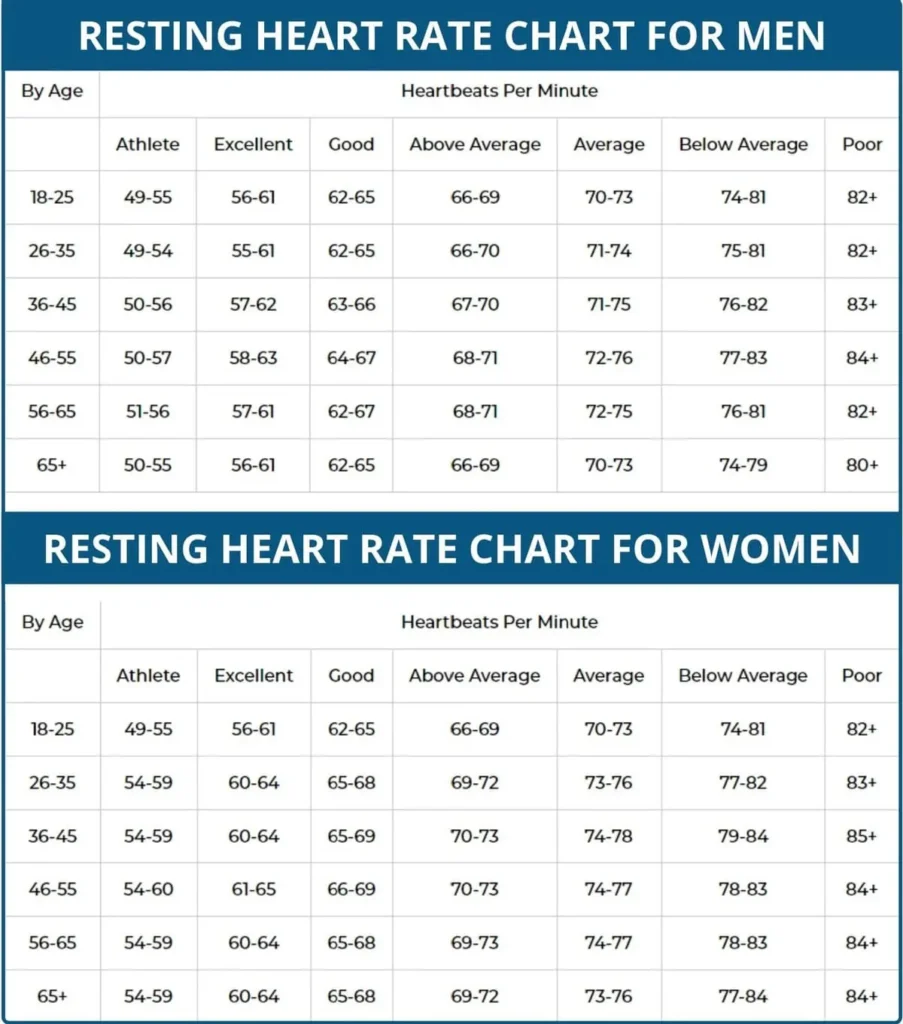How to Lower Heart Rate While Running: 5 Expert Tips and Techniques
Want to improve your running performance and reduce heart rate while running? Discover effective strategies and tips on how to keep your heart rate low while running. Achieve better cardiovascular health, improve your endurance, and optimize your workouts to reach your fitness goals.
How to lower my heart rate while running?
To lower your heart rate while running, focus on gradually building your aerobic base, incorporate high-intensity interval training, and practice proper breathing techniques. At the same time, engage in cross-training and strength training and utilize relaxation techniques. For individualized guidance, speak with a coach or healthcare professional.
What Is Your Heart Rate: 5 Reasons Why It Is Important for a Runner to Monitor It
Heart rate refers to the number of times your heart beats per minute (bpm). It measures how efficiently your heart is pumping blood throughout your body. Heart rate plays a crucial role in a runner’s performance and overall well-being.
For runners, knowing their heart rate is crucial for several reasons:
1. Monitoring Intensity
Heart rate serves as a reliable indicator of exercise intensity. By tracking heart rate during a run, a runner can gauge the effort they are putting into the workout. This helps ensure they are training within their desired intensity zones, whether it be a light jog, moderate pace, or high-intensity interval session. Knowing how to control heart rate while running helps runners avoid overexertion and undertraining, both of which can lead to suboptimal results.
2. Mental Preparation
Mental preparation is a crucial aspect for runners, involving training the mind to develop focus, motivation, and resilience. By understanding and harnessing the power of their thoughts, runners can optimize their performance and overcome mental barriers. This involves identifying driving factors, setting clear goals, focusing on the present moment, building mental resilience, creating a pre-race routine, building a supportive network, and participating in running communities.

3. Training Effectiveness
Heart rate can be used to assess the effectiveness of a training program. By comparing heart rate data over time, runners can observe changes in their cardiovascular fitness. If the same workout becomes easier over time but maintains the same heart rate, this suggests an improvement in fitness level. On the other hand, if the heart rate remains consistently high for the same workout, it may indicate a plateau or a need for adjustments in the training routine.
4. Performance Improvement
Running enthusiasts should always work to enhance their performance in order to attain their objectives. Understanding training methods, pacing, and nutrition allows runners to design a training program that maximizes progress while minimizing the risk of overtraining. By concentrating on performance enhancement, runners can consistently challenge themselves and accomplish new goals.
5. Injury Prevention
Knowing and understanding your heart rate can aid in injury prevention. By maintaining a lower heart rate when running, athletes can reduce the risk of overexertion and potential strain on the cardiovascular system. This knowledge helps runners pace themselves effectively and avoid pushing beyond their limits, which can lead to fatigue, muscle strains, or more severe injuries.
7 Types of Heart Rate in Different States
When it comes to monitoring our cardiovascular health, understanding our heart rate is crucial. Heart rates tend to vary in different states. These states can either reflect physical changes, like running and resting, or mental changes, like stress and emotions.
1. Resting Heart Rate
Resting heart rate refers to the number of heartbeats per minute when the body is completely at rest. It acts as a baseline measurement for an individual’s cardiovascular fitness. On average, a healthy adult’s resting heart rate falls between 60 and 100 beats per minute. Various factors, like age, gender, and fitness level, can impact this baseline value.

2. Training Heart Rate
During physical exercise and training sessions, the heart rate rises to meet the increased demand for oxygen and nutrients from the body. This increased heart rate indicates that the cardiovascular system is efficiently supplying the required resources to the muscles.

3. Running Heart Rate
Running is a popular aerobic workout that has several health advantages. A high heart rate when running is not unusual, particularly for newcomers or those who are pushing themselves. This may be caused by things like increased physical effort, insufficient hydration, improper running form, or extreme heat.
4. Stress
Heart rate can be affected by stress and increase as a result. Adrenaline and other stress chemicals can cause the heart to beat more rapidly and forcefully. Long-term alterations in heart rate and general cardiovascular health can be caused by chronic stress.
5. Sleep and Heart Rate
During sleep, the heart rate naturally decreases as the body enters a state of relaxation. Monitoring heart rate during sleep can provide insights into sleep quality and overall cardiovascular health. Conditions such as sleep apnea, which disrupt normal breathing patterns during sleep, can impact heart rate variability and increase the risk of cardiovascular problems.
6. Medication and Heart Rate
Medications can have an impact on heart rate. Beta-blockers are commonly prescribed to lower heart rate and blood pressure, and stimulant medications may increase heart rate as a side effect. It’s important to consult with a healthcare professional about the potential effects of medications.
7. Emotional State
Emotions can influence heart rate, with different emotions causing an increase or decrease. Excitement, anxiety, and stress can elevate heart rate, while relaxation can lower it. Emotional arousal triggers the release of stress hormones, which can also affect heart rate.
Subscribe to Our Running Newsletter!
Get free running tips from renowned professional athletes and discounts from top-notch brands.
5 Main Reasons Why the Heart Beats Faster While Running
When engaging in physical activities like running, it is not uncommon for the heart rate to increase. However, if you experience a sudden spike in heart rate while running or wonder why is my heart rate high on easy runs, it’s important to understand the underlying reasons. Let’s explore the main factors that contribute to an elevated heart rate during running.
1. Increased Physical Demand
Running increases the demand for blood flow. Your muscles need more oxygen to burn energy, resulting in a high heart rate when running. Your heart beats more forcefully and quickly in response, sending blood that is rich in oxygen to your working muscles. It’s crucial to remember that the level of heart rate increase is greatly influenced by the intensity of your jogging.

2. Elevated Stress Hormones
If you ever wonder why is my heart rate high on easy runs, it is important to understand that exercising beyond your comfort zone triggers the release of stress hormones like adrenaline and cortisol. These hormones prepare your body for a fight-or-flight response, increasing your heart rate as part of this physiological reaction. While this mechanism is beneficial for short bursts of intense activity, it can contribute to a higher heart rate during prolonged or stressful runs.
3. Dehydration
Your heart rate during running can be dramatically affected by dehydration. Your blood volume falls when you are dehydrated, and your heart has to work harder to pump less blood through your body, resulting in a sudden spike in heart rate while running. Ensure you drink enough water before, during, and after your runs to avoid heart rate increases brought on by dehydration.
4. Heat and Humidity
Exercise in hot, humid weather puts more stress on your body, resulting in a high heart rate when running. Your body has a harder time cooling off in high temperatures and humidity, which makes your heart work more to maintain body temperature. It’s critical to keep an eye on the heat index and modify your pace and intensity as appropriate to prevent undue strain on your cardiovascular system.
5. Fitness Level and Training Adaptation
Your degree of fitness has a significant impact on how your heart responds to jogging. Your heart may have to work harder to keep up with the demands of exercise if you’re just starting out with jogging or are generally unfit. Your heart gets more efficient as you train and enhance your cardiovascular fitness, which lowers both your resting heart rate and your heart rate during exercise.
5-Step Guide How to Lower Your Heart Rate
To maximize your performance and cardiovascular health when running, it’s critical that you reduce heart rate while running. Lowering heart rate while running can improve your running experience, produce better outcomes, and maintain a healthy level of general fitness. Let’s explore the primary methods that will lower your heart rate and enhance your running efficiency.
1. Warm Up and Cool Down Properly
If you are wondering how to lower heart rate while running, it’s crucial to begin with a proper warm-up and end with a cool-down session. Before your run, engage in dynamic stretches and light aerobic exercises to gradually increase your heart rate and prepare your body for the activity. This helps your cardiovascular system adjust to the demands of running, preventing sudden spikes in your heart rate. Similarly, cooling down with gentle exercises and static stretches after your run gradually decreases your heart rate, aiding in a smoother recovery process.
2. Incorporate Interval Training
With the help of interval training, athletes often tend to keep heart rate down while running. You challenge your cardiovascular system by switching between short bursts of high effort and rest periods. This helps it adapt and become more effective. Your heart rate increases during the high-intensity intervals and decreases during the rest times. With this type of training, the heart’s capacity to recover fast is enhanced over time, which lowers your resting heart rate and enhances your running performance.
3. Maintain Proper Running Form
Your running form plays a significant role in keeping a lower heart rate when running. Ensure that you maintain an upright posture, relax your shoulders, and engage your core muscles. This proper alignment allows for efficient breathing and optimal oxygen intake, helping to keep your heart rate low. Additionally, focus on shorter strides and a quicker turnover rate, as this reduces the impact on your body, minimizing the stress on your heart.
4. Control Your Breathing
Conscious control of your breathing is how to control heart rate while running. Practice deep belly breathing, inhaling deeply through your nose and exhaling through your mouth. This technique enables optimal oxygen exchange, improving your running efficiency and helping to keep your heart rate lower. As you exhale, imagine releasing tension and stress, further promoting relaxation and a lower heart rate.
5. Gradually Increase Mileage and Intensity
If you want to know how to keep your heart rate low while running, increasing both your mileage and intensity gradually can help. Increasing your running distance and speed over time allows your cardiovascular system to adapt and become stronger. Aim for a progressive training program that gradually challenges your heart while giving it time to recover, leading to long-term improvements in heart rate control.
What Is Low Heart Rate Training?
A common strategy among athletes and fitness aficionados is lowering heart rate while running so you are jogging with a low heart rate. The idea is to maintain a reasonable degree of effort during physical activity, as opposed to pushing oneself to your limitations. This guarantees that your heart rate remains in a predetermined target range. Because of the many advantages of this approach, many individuals have adopted it.
Your body will be prompted to burn a greater proportion of fat as fuel when you exercise at a lower heart rate. Because of this, exercising at a low heart rate is a desirable alternative for anyone trying to get in shape or reduce weight.
The lower risk of injury is a key benefit of a lower heart rate when running. You can avoid putting too much strain on your muscles and joints by maintaining a reasonable heart rate. This supports general joint health and prevents frequent running injuries.
Faster recuperation in between exercise sessions is another advantage of low heart rate training. You allow your body more time to recover by avoiding extreme heart rate increases. By doing this, the risk of overtraining is decreased and subsequent sessions can be completed with improved overall performance.
Pro Tip:
It’s important to understand that a lower heart rate when running is not suitable for every workout. Variety in your training routine is crucial, and it’s necessary to include higher-intensity workouts to challenge your body and maximize performance. Finding the right balance between low and high heart rate training is key to achieving optimal results and overall fitness.
Frequently Asked Questions about How to Lower Heart Rate While Running
Why do I have a high heart rate during a light jog?
Having a high heart rate when running or during a light jog can be due to various factors, such as poor cardiovascular fitness, dehydration, stress, or an underlying medical condition. To lower your heart rate while running, focus on maintaining a steady pace, practice deep breathing techniques, stay hydrated, and gradually improve your fitness level.
Is it normal to run with a high heart rate?
Running with a high heart rate can be normal during intense workouts or when pushing your limits. However, a consistently elevated heart rate may indicate overexertion, poor cardiovascular fitness, or underlying health conditions. It’s important to monitor your heart rate and gradually improve your fitness level to ensure a healthy and safe running experience.
Is a heart rate of 185 beats per minute high while running?
Yes, a heart rate of 185 beats per minute is notably high while running. It indicates that the heart is working at a vigorous intensity, typically within the upper end of the aerobic zone. It is crucial to keep an eye on your heart rate when exercising and speak with a medical professional to make sure it is within a safe range according to your age and fitness.
Final Thoughts on How to Lower Heart Rate While Running
To summarize, lowering heart rate while running is essential for enhancing performance and maintaining cardiovascular health in general. You can train your body to function at a lower heart rate, increase your endurance, lower the chance of overexertion, and encourage effective fuel utilization. To do this, incorporate tactics like maintaining a steady pace, practicing deep breathing, and gradually increasing intensity.
Also read:
- Is Running 3 Miles a Day Good
- Average Running Speed
- Best Running Headbands
- From 5K to 10K
- Plyometrics For Runners
- Why Do My Calves Hurt When I Run
- Running With Glasses
- Best Weighted Vests for Running
References:
- Heart Rate // UC Davis Health: https://health.ucdavis.edu/sports-medicine/resources/heart-rate
- Heart Rate Monitoring in Team Sports—A Conceptual Framework for Contextualizing Heart Rate Measures for Training and Recovery Prescription // Frontiers: https://www.frontiersin.org/articles/10.3389/fphys.2018.00639/full
- Cardiac Output and Performance during a Marathon Race in Middle-Aged Recreational Runners // PMC: https://www.ncbi.nlm.nih.gov/pmc/articles/PMC3356747/
- Resting Heart Rate and Fitness // Verywell Fit: https://www.verywellfit.com/resting-heart-rate-3432632
- Exercise and the Cardiovascular System: Clinical Science and Cardiovascular Outcomes // PMC: https://www.ncbi.nlm.nih.gov/pmc/articles/PMC4493772/
- How raising your heart rate leads to heart health // Colorado State University: https://chhs.source.colostate.edu/how-raising-your-heart-rate-leads-to-heart-health/
- Endurance exercise performance: the physiology of champions // PMC: https://www.ncbi.nlm.nih.gov/pmc/articles/PMC2375555/
- What’s My Ideal Running Heart Rate? // Healthline: https://www.healthline.com/health/running-heart-rate#ideal-rate
If you have any questions or suggestions, you can contact us via email – [email protected]






